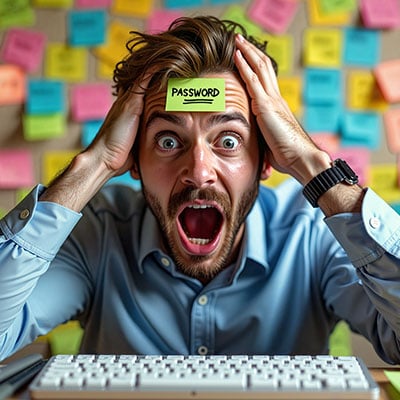The Importance of Passwords Cannot Be Ignored

Passwords protect nearly all of your accounts; or at least you hope that they do. Unfortunately, making a super-secure password that’s easy to remember can be harder than people expect. Oftentimes, it feels like you are constantly solving a puzzle. So then, how do you create passwords that keep hackers out without driving yourself crazy? In this month’s newsletter, we discuss this very problem.
Why Secure Passwords Matter
Hackers are always looking for easy targets. If your password is something simple (like “password123”), it’s like leaving your front door unlocked. You become low-hanging fruit, so to speak. A strong password makes it much harder for anyone to break in and steal your data.
What Makes a Password Secure?
There are plenty of variables that make a password secure. A strong password should be:
- Long – At least 12 characters. The longer, the better!
- Complex – Use a mix of uppercase letters, lowercase letters, numbers, and symbols.
- Unique – Don’t reuse the same password for different accounts.
- Unpredictable – Avoid obvious stuff like your name, birthdate, or “12345.”
Tips for Building Secure Passwords
There is a tried and true way of creating passwords that will keep your accounts safe. Let’s take a look at some of the variables here today.
Use a Passphrase
Think of a random sentence or phrase and turn it into a password. For example:
- Sentence – I love football
- Password – !L0V3fO0tB@Ll!
This makes it long and memorable but still hard to crack.
Substitute Characters
Swap out letters for numbers or symbols:
- Replace “a” with “@”
- Replace “o” with “0”
- Replace “i” with “1” or “!”
Avoid Personal Info
Don’t use anything someone could guess by checking your Instagram or TikTok. This includes your name, birthday, pet’s name, or something that could easily be gleaned like the name of your favorite sports team.
Keeping Track of Passwords
Use a Password Manager
Let’s face it, no one can remember dozens of unique passwords. That’s where password managers come in. These apps securely store all your passwords in one place, so you only need to remember a single master password. Password managers can also create super-strong, random passwords for you, so you don’t have to think of them yourself, while saving them behind military-grade encryption.
Enable Two-Factor Authentication (2FA)
2FA adds an extra layer of security. Even if someone guesses your password, they’ll need a second code (usually sent to your phone or email) to log in. You can use options like authenticators or you can have authentication codes sent to your phone number or email account.
With passwords being so important in computing, you need to have an idea on how to ensure these passwords are kept safe and keep your data and applications secure; especially if you have access to data and network access to your work files.


